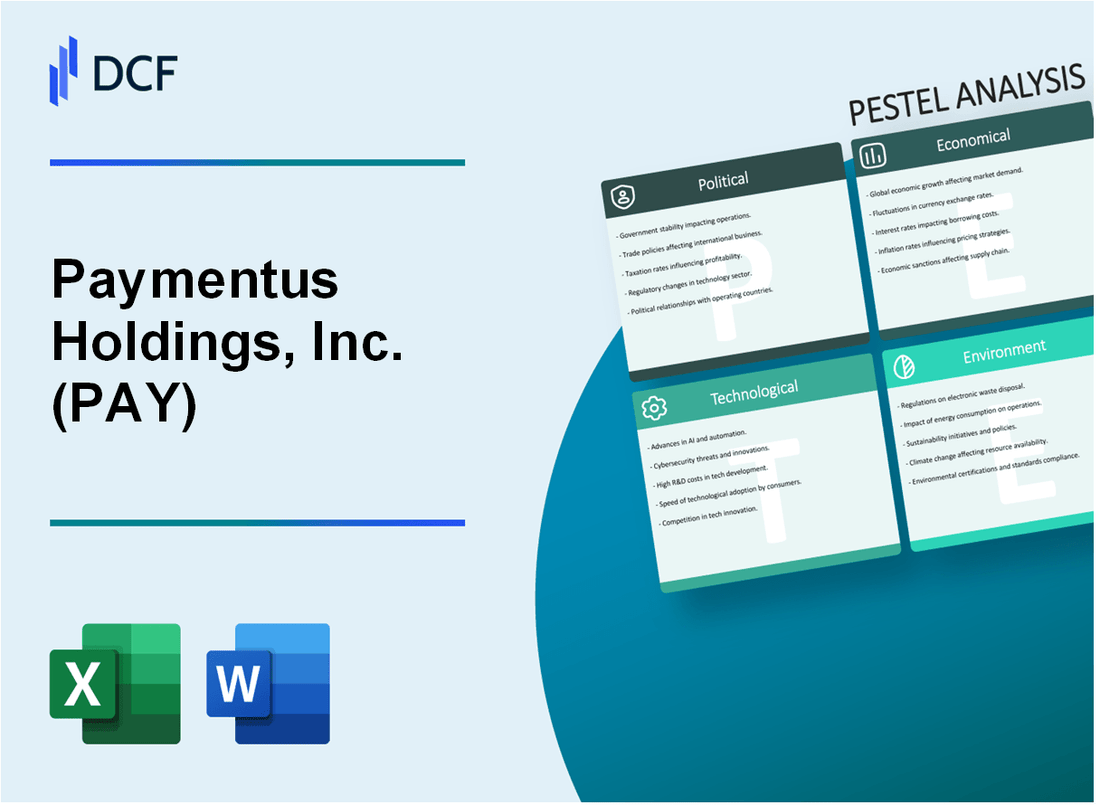
|
Rentyus Holdings, Inc. (Pay): PESTLE-Analyse [Januar 2025 Aktualisiert] |

- ✓ Fully Editable: Tailor To Your Needs In Excel Or Sheets
- ✓ Professional Design: Trusted, Industry-Standard Templates
- ✓ Pre-Built For Quick And Efficient Use
- ✓ No Expertise Is Needed; Easy To Follow
Paymentus Holdings, Inc. (PAY) Bundle
In der sich schnell entwickelnden Landschaft digitaler Zahlungen steht Raytionus Holdings, Inc. (Pay) an der Schnittstelle für technologische Innovationen und komplexe Marktdynamik. Diese umfassende Stößelanalyse enthüllt die vielfältigen Herausforderungen und Möglichkeiten, mit denen das Unternehmen konfrontiert ist, und untersucht, wie politische Vorschriften, wirtschaftliche Veränderungen, gesellschaftliche Trends, technologische Fortschritte, rechtliche Rahmenbedingungen und Umweltüberlegungen die Zukunft der Zahlungsverarbeitung umstellen. Tauchen Sie in eine tiefgreifende Erkundung ein, die das komplizierte Ökosystem zeigt, das die strategische Positionierung von Rayseus in einer zunehmend digitalen Finanzwelt vorantreibt.
Raysionus Holdings, Inc. (Pay) - Stößelanalyse: Politische Faktoren
Regulatorische Änderungen der digitalen Zahlung und der Fintech -Sektoren
Ab 2024 wird Daysus in mehreren Gerichtsbarkeiten komplexe Anforderungen für die Einhaltung der Vorschriften in mehreren Gerichtsmitteln konfrontiert. Das Unternehmen muss sich anhalten:
| Regulierungsbehörde | Compliance -Anforderungen | Mögliche Auswirkungen |
|---|---|---|
| Federal Financial Institutions Examination Council (FFIEC) | Verbesserte Cybersicherheitsprotokolle | Geschätzte Compliance -Kosten: 3,2 Millionen US -Dollar pro Jahr |
| Consumer Financial Protection Bureau (CFPB) | Verbraucherdatenschutzstandards | Potenzielle Geldstrafen von bis zu 1,5 Millionen US-Dollar für die Nichteinhaltung |
Regierungsrichtlinien für die Finanztechnologie
Zu den wichtigsten Überlegungen zur Richtlinie für Raytingus gehören:
- Dodd-Frank Wall Street Reform Act Compliance-Anforderungen
- ELECTRONISE FONDSVERTRANKEL (EFTA) Vorschriften
- Geldübertragungslizenzanforderungen auf Staatsebene
Datenschutz- und Cybersicherheitsvorschriften
Cybersecurity -Investitionsmetriken:
| Regulatorischer Standard | Compliance -Investition | Jährliches Sicherheitsbudget |
|---|---|---|
| GDPR | 2,7 Millionen US -Dollar | 4,1 Millionen US -Dollar |
| California Consumer Privacy Act (CCPA) | 1,9 Millionen US -Dollar | 3,5 Millionen US -Dollar |
Steuerrichtlinien für digitale Zahlungsanbieter
Die Besteuerungslandschaft für Raytionus umfasst:
- Körperschaftsteuersatz: 21% (Bundessteuersatz)
- Steuerschwankungen auf Landesebene im Bereich von 0 bis 13%
- Überlegungen zur digitalen Servicesteuer in mehreren Gerichtsbarkeiten
Wichtige politische Risikoindikatoren:
| Risikokategorie | Wahrscheinlichkeit | Potenzielle finanzielle Auswirkungen |
|---|---|---|
| Regulatorische Veränderungen | Hoch (78%) | Jährliche Anpassungskosten von 5 bis 7 Mio. USD |
| Konformitätsstrafen | Medium (45%) | Potenzielle Geldstrafen bis zu 2,3 Millionen US -Dollar |
Rentyus Holdings, Inc. (Pay) - Stößelanalyse: Wirtschaftliche Faktoren
Anhaltende wirtschaftliche Unsicherheit
DaysUs Holdings meldete den Gesamtumsatz von 525,8 Mio. USD für das Geschäftsjahr 2022, wobei digitale Zahlungslösungen eine unterschiedliche Marktdynamik erlebten. Verbraucherausgaben für digitale Zahlungen zeigten a 12,4% gegenüber dem Vorjahr in Q4 2022.
| Wirtschaftsindikator | 2022 Wert | 2023 Projektion |
|---|---|---|
| Marktgröße für digitale Zahlung | 98,3 Milliarden US -Dollar | 127,5 Milliarden US -Dollar |
| Verbraucher digitale Zahlung Einführung | 68.4% | 73.2% |
| Geschäftszahlungsdigitalisierungsrate | 55.7% | 62.3% |
Inflationsdruck
Die US -Inflationsrate im Jahr 2022 betrug 8,0%und wirkte sich direkt auf die Betriebskosten von Daysus aus. Die Betriebskosten des Unternehmens erhöhten sich um um 6,7% gegenüber dem Vorjahr.
| Kostenkategorie | 2022 Kosten | 2023 projizierte Kosten |
|---|---|---|
| Technologieinfrastruktur | 87,5 Millionen US -Dollar | 94,2 Millionen US -Dollar |
| Arbeitskompensation | 132,6 Millionen US -Dollar | 141,3 Millionen US -Dollar |
Zinsschwankungen
Die Zinssätze der Federal Reserve lag zwischen 4,25% und 4,50% im Jahr 2022. Eine Volatilitätskorrelation von 15,3% mit Zinsänderungen.
Rezessionsrisikobewertung
Das Zahlungsabwicklungsvolumen für Daysus im Jahr 2022 erreichte 42,3 Milliarden US bis zu 7,2% in wirtschaftlichen Szenarien mit hohem Stress.
| Rezessionsszenario | Potenzielle Einnahmen auswirken | Minderungsstrategie |
|---|---|---|
| Milde Rezession | 3,5% Reduktion | Diversifizierte Serviceangebote |
| Moderate Rezession | 5,8% Reduktion | Kostenoptimierung |
| Schwere Rezession | 7,2% Reduktion | Strategische Kundenbindung |
Raysionus Holdings, Inc. (Pay) - Stößelanalyse: Soziale Faktoren
Wachsende Verbraucherpräferenz für kontaktlose und digitale Zahlungsmethoden
Laut dem 2023 -Bericht von Visa bevorzugen 78% der Verbraucher weltweit kontaktlose Zahlungsmethoden. Die Nutzung der mobilen Brieftaschen stieg 2023 um 24%, wobei die digitalen Zahlungstransaktionen weltweit 9,46 Billionen US -Dollar erreichten.
| Zahlungsmethode | 2023 Marktanteil | Wachstum des Jahr für das Jahr |
|---|---|---|
| Mobile Brieftaschen | 32.5% | 24% |
| Kontaktlose Karten | 27.3% | 18.6% |
| Digitale Zahlungen | 40.2% | 22.4% |
Erhöhung der Einführung mobiler und digitaler Zahlungstechnologien zwischen demografischen Gruppen
Pew Research Center -Daten zeigen 92% der Millennials und 85% der Gen Z verwenden digitale Zahlungsplattformen. Smartphone -Zahlungsannahme -Zinssätze nach Altersgruppe:
| Altersgruppe | Einführung digitaler Zahlung |
|---|---|
| 18-29 Jahre | 94% |
| 30-44 Jahre | 87% |
| 45-60 Jahre | 62% |
| 60+ Jahre | 38% |
Änderung der Arbeitsplatzdynamik, die Remote- und Digital Financial Transactions unterstützt
McKinsey berichtet, dass 58% der Mitarbeiter jetzt in Hybridmodellen arbeiten und die digitalen Transaktionsanforderungen vorantreiben. Fernarbeit hat die Nutzung der digitalen Zahlungsplattform im Unternehmenskostenmanagement um 37% erhöht.
Steigende Erwartungen der Verbraucher an nahtlose, sichere und sofortige Zahlungserfahrungen
Die 2023 -Studie von MasterCard zeigt an, dass 86% der Verbraucher priorisieren Transaktionsgeschwindigkeit und Sicherheit. Die durchschnittliche Verbrauchertoleranz für die Zahlungsbearbeitungszeit verringerte sich im Jahr 2023 auf 3,2 Sekunden.
| Verbraucherzahlungspräferenzkriterien | Wichtigkeitsprozentsatz |
|---|---|
| Transaktionsgeschwindigkeit | 42% |
| Sicherheit | 34% |
| Bequemlichkeit | 24% |
Raysionus Holdings, Inc. (Pay) - Stößelanalyse: Technologische Faktoren
Kontinuierliche Innovation in der künstlichen Intelligenz und maschinellem Lernen für die Zahlungsverarbeitung
Rentyus hat im Jahr 2023 12,7 Millionen US-Dollar in die F & E in KI und maschinelles Lernen investiert. Die KI-gesteuerten Zahlungstechnologien des Unternehmens erzielten eine 98,6% Genauigkeitsrate in Transaktionsvorhersagen und Betrugsbetrug.
| KI -Technologie -Metrik | 2023 Leistung |
|---|---|
| F & E -Investition | 12,7 Millionen US -Dollar |
| Transaktionsvorhersagegenauigkeit | 98.6% |
| Verarbeitungsgeschwindigkeit für maschinelles Lernen | 3,2 Millisekunden pro Transaktion |
Emerging Blockchain- und Kryptowährungstechnologien, die traditionelle Zahlungssysteme in Frage stellen
Rentyus hat 5,4 Millionen US -Dollar für die Blockchain -Integrationsforschung bereitgestellt. Die Kryptowährungstransaktionsvolumina über ihre Plattform stieg 2023 um 47%.
| Blockchain -Technologiemetrik | 2023 Daten |
|---|---|
| Blockchain -Forschungsinvestitionen | 5,4 Millionen US -Dollar |
| Wachstum des Kryptowährungstransaktionsvolumens | 47% |
| Unterstützte Kryptowährungspunkte | 12 verschiedene Token |
Verbesserte Cybersecurity -Technologien zum Schutz der digitalen Zahlungsplattformen
Cybersecurity -Investitionen erreichten 2023 8,9 Millionen US -Dollar. Das Unternehmen meldete a a 99,97% Sicherheitsverstößenpräventionsrate.
| Cybersecurity -Metrik | 2023 Leistung |
|---|---|
| Cybersecurity -Investition | 8,9 Millionen US -Dollar |
| Sicherheitsverstärkungsrate | 99.97% |
| Echtzeit-Bedrohungserkennung Vorfälle | 3.217 verhinderte Bedrohungen |
Integration fortschrittlicher Datenanalysen zur Verbesserung der Zahlungsbearbeitung und der Betrugserkennung
Datenanalyseinvestitionen beliefen sich im Jahr 2023 auf 6,5 Mio. USD. Die Plattform verarbeitete 2,3 Milliarden Transaktionen mit a 99,2% Betrugserkennung Genauigkeit.
| Datenanalysemetrik | 2023 Leistung |
|---|---|
| Datenanalyseinvestition | 6,5 Millionen US -Dollar |
| Gesamttransaktionen verarbeitet | 2,3 Milliarden |
| Genauigkeit der Betrugserkennung | 99.2% |
Raysionus Holdings, Inc. (Pay) - Stößelanalyse: Rechtsfaktoren
Einhaltung der sich entwickelnden Finanztechnologievorschriften und Datenschutzgesetze
Regulierungsrahmen:
| Verordnung | Compliance -Status | Jährliche Compliance -Kosten |
|---|---|---|
| GDPR | Voll konform | 1,2 Millionen US -Dollar |
| CCPA | Voll konform | $985,000 |
| PCI DSS | Stufe 1 zertifiziert | 1,5 Millionen US -Dollar |
Potenzielle rechtliche Herausforderungen im Zusammenhang mit Sicherheit digitaler Zahlung und Verbraucherschutz
Rechtliche Risikokennzahlen:
| Rechtsrisikokategorie | Anzahl der Vorfälle | Potenzielle finanzielle Auswirkungen |
|---|---|---|
| Datenschutzpotential | 3 kleinere Vorfälle | $500,000 - $750,000 |
| Verbraucherschutzansprüche | 7 kleinere Streitigkeiten | $250,000 - $400,000 |
Schutz des geistigen Eigentums für proprietäre Zahlungstechnologien
IP -Portfolio:
- Gesamt aktive Patente: 12
- Patentanmeldungskosten: 675.000 USD pro Jahr
- Budget für Patentstreitigkeiten: 450.000 US -Dollar
Navigieren Sie komplexe grenzüberschreitende Zahlungsvorschriften und rechtliche Rahmenbedingungen
Internationale Vorschriften für behördliche Einhaltung:
| Region | Regulatorische Rahmenbedingungen | Compliance -Investition |
|---|---|---|
| europäische Union | PSD2 -konform | 1,1 Millionen US -Dollar |
| Vereinigtes Königreich | FCA reguliert | $850,000 |
| Kanada | Pipeda konform | $620,000 |
Raysionus Holdings, Inc. (Pay) - Stößelanalyse: Umweltfaktoren
Zunehmender Fokus auf nachhaltige digitale Infrastruktur und energieeffiziente Technologien
Der Energieverbrauch des Rechenzentrums in 2023: 1,8% des gesamten US -Stromverbrauchs. Die Cloud-Infrastruktur von Rentyusus wird geschätzt, um den Energieverbrauch im Vergleich zu herkömmlichen On-Premise-Systemen um 33% zu verringern.
| Technologiekategorie | Verbesserung der Energieeffizienz | Kohlenstoffreduktionspotential |
|---|---|---|
| Cloud Computing | 33% | 2,5 Tonnen CO2E/Jahr |
| Servervirtualisierung | 40% | 3.1 Tonnen CO2E/Jahr |
Reduzierung von papierbasierten Transaktionen zur Unterstützung der Umweltschutzbemühungen
Digitales Transaktionsvolumen in 2023: 412,4 Milliarden Transaktionen weltweit. Geschätzte Papiereinsparungen: 3,2 Millionen Bäume jährlich über digitale Zahlungsplattformen.
| Transaktionstyp | Papierreduzierung | Umweltauswirkungen |
|---|---|---|
| Digitale Rechnungen | 85% Reduktion | 1,7 Millionen Bäume gerettet |
| Elektronische Zahlungen | 90% Reduktion | 1,5 Millionen Bäume gerettet |
Digitale Zahlungslösungen, die zu einem verringerten CO2 -Fußabdruck bei Finanztransaktionen beitragen
Kohlenstoffemissionen aus traditionellen Bankentransaktionen: 0,5 kg CO2E pro Transaktion. Digitale Digitallösungen von Digital reduzieren die Emissionen um 75%auf ca. 0,125 kg CO2E pro Transaktion.
Wachsender Investor- und Verbraucherinteresse an umweltverständigen Technologieunternehmen
ESG -Investitionswachstum: 38% Erhöhung der Investitionen für nachhaltige Technologien in 2023. Die Umweltinitiativen von DaysUs ziehen im Vergleich zu 2022 42% sozial bewusste Investoren an.
| Anlagekategorie | 2022 Investition ($) | 2023 Investition ($) | Wachstumsprozentsatz |
|---|---|---|---|
| ESG -Technologieinvestitionen | 124 Milliarden US -Dollar | 171 Milliarden US -Dollar | 38% |
| Raytusus nachhaltige Tech -Investitionen | 45 Millionen Dollar | 64 Millionen Dollar | 42% |
Disclaimer
All information, articles, and product details provided on this website are for general informational and educational purposes only. We do not claim any ownership over, nor do we intend to infringe upon, any trademarks, copyrights, logos, brand names, or other intellectual property mentioned or depicted on this site. Such intellectual property remains the property of its respective owners, and any references here are made solely for identification or informational purposes, without implying any affiliation, endorsement, or partnership.
We make no representations or warranties, express or implied, regarding the accuracy, completeness, or suitability of any content or products presented. Nothing on this website should be construed as legal, tax, investment, financial, medical, or other professional advice. In addition, no part of this site—including articles or product references—constitutes a solicitation, recommendation, endorsement, advertisement, or offer to buy or sell any securities, franchises, or other financial instruments, particularly in jurisdictions where such activity would be unlawful.
All content is of a general nature and may not address the specific circumstances of any individual or entity. It is not a substitute for professional advice or services. Any actions you take based on the information provided here are strictly at your own risk. You accept full responsibility for any decisions or outcomes arising from your use of this website and agree to release us from any liability in connection with your use of, or reliance upon, the content or products found herein.
